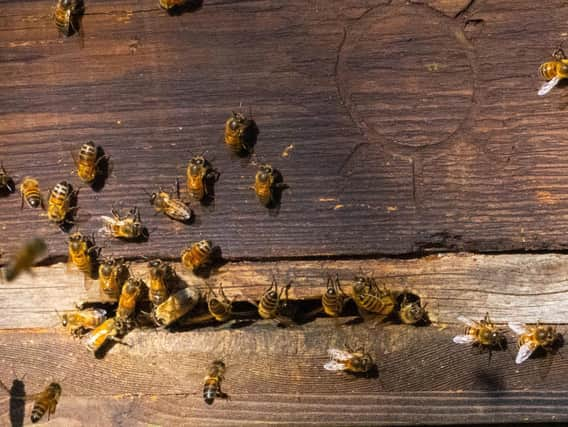The imported threat to our honey bees and the petition which is trying to stop it reaches more than 16,000 signatures


There are rules about moving bees over borders and where there are rules there are people who break them. Even when the rules are very sensible.
People have been deliberately transporting bees for several centuries. There were no honeybees in North America before the arrival of Europeans. Nor were there any in Australia or in New Zealand. It wasn’t long before someone was tempted to bring them in.
Advertisement
Hide AdAdvertisement
Hide AdFor the human migrants almost everything about importing honeybees felt like a gain. Wax to burn in your candles, sweet tasty honey and free pollination are things that are pretty hard to resist if you are trying to scratch a living in a new land.
Yet the rapid introduction of billions of new insects into an eco-system isn’t all gain.
It has a significant impact on the local wildlife. Once you have brought bees into a new environment it is virtually impossible to prevent them spreading. They are there for ever more. As are any unpleasant pests and diseases that they bring with them.
Bees suffer from an incredibly wide range of threats to their health including attacks from fungal spores, viruses, bacteria, microsporidia, flies, beetles, and a horrible range of mites that suck away all their strength.
Advertisement
Hide AdAdvertisement
Hide AdOver hundreds of thousands of years bees from any one part of the world have learned how to deal with the health problems that exist in their local environment. It is only when new health threats arrive in their neighbourhood that they really struggle to cope, and their defences fail them.
This means that the only responsible way to acquire a new hive of bees is to collect a local swarm or to split a local hive.
To make this happen many local beekeepers put a lot of hard work in over the summer responding to phone calls from members of the public who have come across a swarm of bees and want help dealing with them.
Collecting that swarm can sometimes be pretty simple. The first swarm I dealt with this summer had conveniently settled themselves on a wall. All I had to do was put my collecting box underneath them and quickly sweep them into the box.
Advertisement
Hide AdAdvertisement
Hide AdOnce I had got the queen in there any of the bees that I’d missed gradually decided to join her and within half an hour I had 10,000 or so bees neatly under control. I taped up the entrance and it was then easy to put the box in the back of my car and drive them a few miles to their new home.
On other occasions life is a lot harder. The next swarm I met with was two storeys up on a roof line in a void that I couldn’t get access to from inside the house.
Faced with difficulties like that some beekeepers are tempted to simply order a supply of bees or even just a queen bee over the internet and wait for it to be delivered. The consequences of doing that can be horrific.
A few years back someone in Britain bought some bees from abroad. They carried a tiny mite that feeds off bees. None of the bees in Britain had ever encountered that parasite before and in an astonishingly short time virtually every hive of bees in Britain was infected with something called varroa mite.
Advertisement
Hide AdAdvertisement
Hide AdThe newly arrived pest killed off thousands of hives. Now every beekeeper has to spend hours of time and not a little money working hard to try and prevent these new arrivals from damaging their bees too badly.
One accidental import has caused problems for the entire stock of honeybees in Britain.
That is why it has proved necessary to try and prevent the practice of bringing bees into Britain. Yet cheap prices and convenience continues to tempt people to dodge the rules and buy bees from abroad regardless of the consequences.
Just at the moment the most popular transport route runs through Northern Ireland. One of the more obscure quirks of Brexit is that bees can be brought into the Republic of Ireland from across the continent pretty easily and can equally easily be driven across the border to the North.
Advertisement
Hide AdAdvertisement
Hide AdThey are then being brought into the rest of the United Kingdom in significant numbers.
Responsible British beekeepers are currently campaigning hard to get this trade in bees stopped. Dodgy suppliers are working hard to avoid those controls.
It turns out that international bee rustling is a pretty profitable operation and that it is putting the health of our local bees at severe risk.
Our Yorkshire beekeepers need much stronger controls over that trade. And we need it quickly.
The Petition
Advertisement
Hide AdAdvertisement
Hide AdThe British Beekeeping Association is running a petition which aims to close the loophole in import regulations that can allow a “devastating” pest, the small hive beetle, to arrive in the UK through packages of bees brought into the UK through Northern Ireland.
More than 16,000 people have so far signed the petition with the 10,000 mark triggering a response from Defra. The aim is to reach 100,000 signatures which will force a debate on the issue in Parliament.
The hive beetle can multiply to huge numbers within infested colonies, where it eats brood, honey and pollen. Under previous arrangements, an inspection regime at points of import prevented it from being established in the UK.
Sign the petition at: parliament.uk/petitions/ 577603